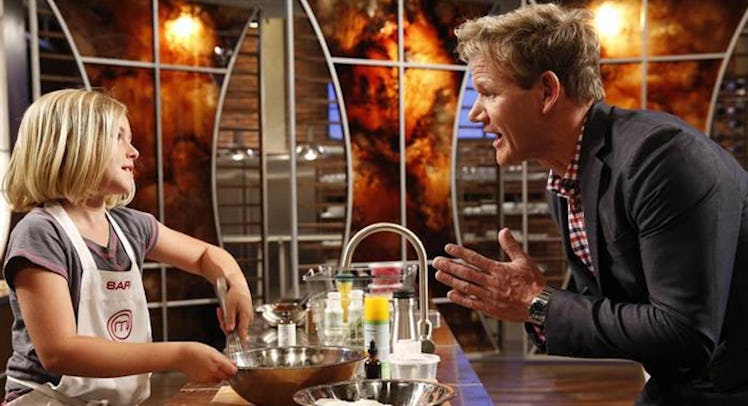‘MasterChef Junior’ is the Crowning Achievement of Gordon Ramsay’s Career
More than five years after its debut, the Fox cooking competition has become arguably the most enjoyable reality TV show ever made.

Earlier this month, MasterChef Junior returned to Fox for its sixth season. A few episodes in, it’s clear that the show hasn’t lost any steps. It remains superlative — the rare reality TV show that feels real and is actually pleasurable to watch. The show still works because it has a simple premise, kids ages 8-13 compete to create the best dish and the winner gets $100,000 and the coveted MasterChef Junior Trophy, and because the showrunners aren’t obsessed with reinforcing that premise. Rather than focusing on competition, the show lingers on Gordon Ramsay, spotlighting his delightful rapport with children. It’s essentially a show about a tough guy who is great with kids. That’s it and that’s enough.
Putting kids on TV is always a risk because they are generally either too self-conscious or not self-conscious enough. This risk is compounded by the meta-textual fuzziness of reality television, which depicts organic emotions by inorganically triggering them. Kids, as a species, want attention so they are prone to tying themselves in knots on camera. What Ramsay does, which is genuinely impressive, is give them enough attention that they stop and just focus on cooking. And watching a child try to do something really well is genuinely pleasant. The stakes always feel high.
And, yes, there are technically other judges on the show, but no one cares when Ramsay is out there offering up the best work of his tele-culinary career.
People who aren’t watching this show, either because they’re busy or because they are foolish, have likely heard rumors of Ramsay’s kid-whispering abilities. It’s impossible to overstate — well, perhaps not impossible — how impressive they are to behold and how interesting they are in the context of the famously foul-mouthed chef’s larger oeuvre. Before Junior came along, it was easy enough to believe that Ramsay was a telegenic prick. But it turns out it’s not so simple as that. At his core, the show suggests, he’s a passionate man who believes that honesty and hard work are the building blocks of success. He is merely fanatical about potential.
Why is Ramsay so great with kids? Because unlike a lot of adults, Ramsay doesn’t talk down to kids like they’re sweet little idiots or bumbling, obnoxious monsters. He’s savvy enough to understand that kids respond well when they’re actually treated like human beings and while he obviously tones down his language and anger when he’s interacting with kids, he’s not afraid to shoot straight with them and offer up constructive criticism.
While the occasional kid can’t stand the heat, most enjoy Ramsay’s blunt honesty and it’s a blast to watch him banter with children. Whether he is celebrating a kid for creating a delicious dessert or gleefully trading barbs with a kid over a failed parfait, Ramsay is fantastic at pulling younglings into the adult world without patronizing them. In the third episode of the new season, for example, he approaches a young girl named Beni as she is preparing a New York strip steak. Ramsay can see that she is nervous so he provides some encouragement. She relaxes. She pauses. She tell him that she’s up to the task.
And, in that moment, the audience gets to watch her learn a lesson about shutting out the noise and going all in on something. Adults get to relearn how to proceed with passion, a skill often discarded after decades of triangulation or mitigated success. This is beautiful TV. This is uplifting TV. This has very little to do with cooking.
As long as MasterChef Junior allows Ramsay to interact with kids in an honest way, the show will continue to set itself apart from other reality shows that rely on gimmicks or manufactured drama to manipulate viewers. The amazing thing about the show is that it sets children up to succeed and then provides them the room and safety to fail without being humiliated or devastated. It is a reality show that models powerfully good adult behavior. There aren’t many of those.